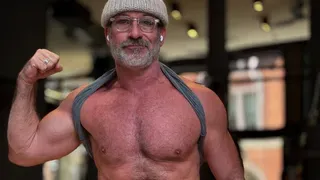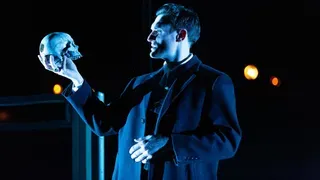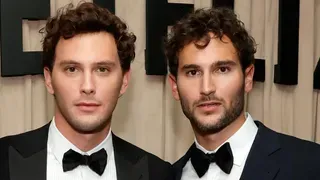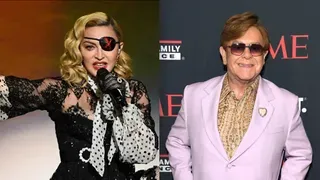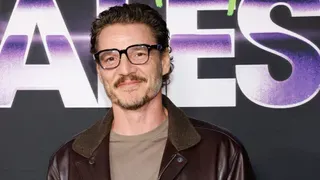January 9, 2017
Inside 'Retake': Director & Actors Talk New GLBT Indie
Frank J. Avella READ TIME: 16 MIN.
"Retake" is that wonderful oddity: a gay-themed two-hander that sharply focuses on the journey of its characters and their new and rather unconventional relationship.
Jonathan (Tuc Watkins) is an enigmatic middle-aged man at a crossroads who picks up an affable male prostitute (Devon Graye) whom he hires to accompany him on a road trip to the Grand Canyon, insisting he play the role of "Brandon."
Initially put off by questions, Jonathan slowly begins to reveal small details about his past and the part his rentboy is playing. As the two grow closer, "Brandon" becomes more and more frustrated by the role-play and forces a confrontation.
Writer-director Nick Corporon shows great promise with his first narrative feature, having already made a number of award-winning shorts. And a large part of "Retake's" success has to do with how well he's cast his film.
Watkins, a veteran of stage ("White's Lies," Fortune's Fool"), screen ("The Mummy," "The Good Shepherd") and television ("One Life to Live," "Desperate Housewives") delivers a powerful performance in a rare dramatic outing for the actor.
And the ubiquitous Graye matches him scene for scene in a tricky part that he nails. It's a nuanced turn that exposes the character's deep longing and pain. Graye first came to prominence playing the young "Dexter" on Showtime and has also appeared on TV in "American Horror Story: Asylum" and "The Flash," as well as in a recent string of indie films that include, "I Am Michael," "Search Engines" and "Last Weekend" -- all GLBT-themed.
Edge recently spoke with Corporon, Watkins and Graye. Here are highlights from the three chats.
On the inspiration for "Retake"
Nick Corporon: I'm intrigued by relationship stories and stories about people who are obsessed with the past, obsessed with their own memories. People go through life and miss out on certain opportunities... I was crossing 30 and I had this moment where I felt this strong nostalgic pull towards the past-past relationships, past experiences, realizing I'd really racked up good experiences in my life. But at the time I really failed to recognize it when I was in the moment. So from there, I had the idea of creating a character who was really flawed-who really wanted to look back at his past and try to relive it in this weird, interesting, haunted way. So I crafted the idea of the movie from there.
On the importance of the locations
Nick Corporon: I'm from Missouri, and so is my producer/cinematographer Colin (Brazie). We really wanted to set it in the desert because we're just in love with the kind of haunted, empty space that comes with the Route 66 journey out to the ocean. And it fit perfectly with the theme of reliving the past, trying to invest in something that's not there-putting emotions into this nostalgia that's long been abandoned.
On casting Tuc and Devon
Nick Corporon: It started with Tuc. It was important to find somebody who was the character's age. He's written to be 45-50 years old. You don't see that many 45-year-old actors, especially openly gay actors, onscreen. And it had to be a May/December romance. I had known of Tuc's work on 'Desperate Housewives.' ... I thought if you cast somebody like Tuc Watkins, that's mystery. He's mysterious-why is he paying people to have sex with him? Which I think is the central conflict of the first half of the movie. So it was important to me to have Tuc's traits, somebody who behind this confident exterior was this really tormented, sad guy. And I thought Tuc was absolutely perfect for that.
Tuc Watkins: Nick sent me the script. I didn't know him. I read the first page and -- I heard Bryan Cranston say once that he read the first page of 'Breaking Bad' and there was a guy in his underwear, wearing a gas mask, driving an RV with two dead bodies in back and he said, 'I didn't need to read anymore. I wanted to do that project.' I had a similar reaction when I read, 'Retake.'
On this first page you've got this seemingly strange man who is meticulously packing a suitcase and he puts an antiquated Polaroid camera in there and a man's wig and I thought, 'well I want in on this ride, I want to play this guy.' I had a visceral reaction to just the first page. Then when I read the rest of the story, it's such a heartbreaking, moving story you can't help but want to be part of the project when you're an actor.
Nick Corporon: I knew Devon's work from 'Dexter.' He was the suggestion of our casting directors, Jenny Treadwell and Monica Kelly, who work in TV... He was perfect because playing Young Dexter he has that darkness to him. He's got that duplicitous layer and would make a good fit for this character that is trying to be anybody but himself, who is uncomfortable in his own skin and who can, on a dime can be whatever his client.
Devon Graye: It was an offer actually, which is so rare for someone like me. I don't get offers. I usually have to audition and then audition again... So first and foremost that is so exciting, especially at the stage I am in my career... People actually know who I am and trust that I'm going to do a good job without my having to try out a bunch of times for it.
It's also intimidating because I didn't audition, there's that pressure: can I do this? Am I going to do justice to this role? Is my version of this character going to match up with what his version is? But we worked really well together and he just let me do my thing a lot of the time.
On the importance of casting out actors for GLBT roles
Nick Corporon: Yes, it's absolutely important. I don't want to say that you should only cast gay actors for gay roles. For this project it was important for me to cast openly gay actors...especially those two. It was important because of chemistry more than anything.
On the filmmaking process
Nick Corporon: You spend all this time as a filmmaker toiling on the page as a writer... as soon as you give it to an actor and you start hearing those words come out if their mouths, it's just tremendous. To see what they can do with it -- they can approach it from different angles and come up with all these different ideas that you hadn't even thought of. That's my favorite part of the process. And I'm big on rehearsal. We only had 16 days to shoot the movie and we took two full days before shooting to really go through every single scene in the script, line by line and talk out every single beat between the three of us...They come out of theatre and they ate that up... We were changing the script right up until shooting, making the process as fluid and open to communication as possible.
Tuc Watkins: My process is actually very similar to Devon's. I take a script and break it down scene by scene. I actually create this bar graph, the arc of where a character starts, where he heads and where he ends up. It usually looks a little bit like a rainbow with some waves in there. It helps me know where I need to get to emotionally or intensity on one scene vs. another scene because when you're shooting a whole movie in 16 days, you kind of got to know where you need to be on a moment's notice. So I break it down mathematically, so there's a science to it and the arc comes from that. I know it sounds touchy-feely weird but Devon did the same exact thing so maybe that's part of why we work together (so well) we think alike.
The three of us (Nick included) had a similar sensibility on what this thing ought to be, what it ought to look like. And we may come at it with different ideas. I proposed a couple of things to Nick and he said, 'We'll give that a shot,' which is a really smart thing for a director to say to an actor. (laughs) It makes the actor feel like they're heard...and if you approach that in a way that you're really hoping for what is best for the film as opposed to specifically putting your stamp on the movie, I think that's where good projects come from.
Devon Graye: I think for a long time -- working in TV especially -- there's sort of this cookie cutter version of doing things. Okay, I'm going to play the messed up kid who kills his dad on 'CSI' so I'm going to have to cry a lot -- all these things that are surface level. Not by the fault of those show but by the approach of the actors.
And before I did 'Retake' I reevaluated my whole process as an actor and realized I want to do deeper work, truer work to me and who I am. And I want acting to be my revealing myself onscreen and not trying to play a character by laying things on but approaching a character by going, what does my anger look like, what does my sadness look like? What are the things I can reveal about the human experience that are personal to me? So getting to play this character in 'Retake,' he runs the gamut of different emotions. He starts out playing a character and then slowly, scene by scene, starts pulling off these layers and showing who he is. So it was a great way for me to explore this new style of acting.
On chemistry between the actors
Devon Graye: I think chemistry is something that happens when both people are open with each other. I really do believe you can have chemistry with anybody if you're just open and honest with someone in the moment. And I think that so much of acting with your scene partner is just truly talking to them and opening your heart to them in a moment and sharing with them in vulnerability.
Tuc Watkins: I think you have chemistry with someone or you don't...Nick Corporon should be a yenta or a matchmaker or something because Devon and I never met. He chose me. He chose Devon. He threw us together. And, fortunately for everyone, I think it really worked out. I really developed a great affection for Devon. He's 20 years my junior. He's an amazing actor. There's such a stillness about his performance that I didn't have when I was his age. I really admire him as an actor.
On researching being a hustler
Devon Graye: I did do a lot of research. I read 'City of Night,' (by John Rechy) which is the most brilliant, brilliant writing that I've read in a while. I know it's partly fiction, partly his autobiography, but I loved it. It was very informative. And then I saw this documentary. It was a bunch of interviews with male prostitutes in Los Angeles -- all these real guys from all walks of life.
But at the end the most important thing was to always make sure I'm just playing a human being. And not a human being in the cloak of the prostitute and not trying to cover him up by any of the tropes or ideas about that and still just keep him a real person because that's what he is.
On the film's ending
Nick Corporon: It's funny, we've taken this movie all over the U.S., we've done over 30 film festivals and that question has been at every Q&A. Is this how you always wanted to end it, were you ever conflicted about ending it this way? And the answer is, no. That is the ending that I wanted from the first minute of figuring out the story. Endings are incredibly important for me because I can't start a script until I know where I'm going. It's like a road trip. You have to have a destination otherwise you're going to meander all over the place. So I don't sit down to write a script until I know, pretty much, what the last shot is going to be.
(SPOILER) It's been fun to take it all these cities and see how audiences are split...some people are angry that it ends in a realistic way. Others applaud and thank me for it. And I like that people can walk away with those two different reactions. I tell them if you're not satisfied with the ending, you can turn it off two minutes early and have the ending you want. (laughs)
On the Festival Circuit
Nick Corporon: I got my start working the LGBT film festival circuit with short films. So taking 'Retake' out has really been a joy because the LGBT community is such a devoted community that want these films... we pack these theatres full of people who want to see gay stories on the screen. And it's important we have these film festivals, especially in the age of Donald Trump. That we keep this niche as flourishing as possible because the next four years are a huge question mark right now and we've got to have our diversity and celebrate it as much as we can.
On the right role at the right time
Tuc Watkins: This role hit me at the right time. I was 48 when I made the movie -- mid-life. I was looking over my shoulder behind what I'd done in my life as much as I was looking ahead in my life. And Jonathan was at the same crossroads. Not necessarily going through the same things that I was or I was going through what he was going through, but there's this emotional state of mind when a gay man reaches a certain stage in life... Not to go off on a dark tangent but a guy like me who is now 50, I have a lot of gratitude just for turning 50. So many of the people I knew when I came out in the early 90s are dead. There was a holocaust going on. And gay people were meant to feel like it was their fault and that having sex was Russian roulette. Fortunately safe sex came into play and we learned from that but when I tie it to this role and playing this part, there's grieving that goes on in this movie.
And its not issue oriented. It's important for LGBT films to have a storyline like this. Gay people grieve also. They don't necessarily always grieve because someone died from AIDS or HIV or a drug overdose. But we don't have a lot of mentors to pace us or coach us or to just be there for us to reflect on. I think that's why this guy (Jonathan) is so stuck. Because he's alone and he doesn't have any guideposts out there to help him and I think that's something that's happening in gay culture. We don't have a lot of people to look to pave the path for what the second half of our lives are going to look like.
On whether GLBT characters are well represented in films
Devon Graye: I think certainly we've taken a large leap in the last 10 years in a good direction. Just the fact that we now have two men kissing on TV is a big deal because I remember in the 90s you never saw anything like that. Maybe you could see two women. Like on 'Buffy.' But they held back for a long time with two men... There's so many now that are just there and it's awesome. Of course there could always be more and I would love for it to get to a place where the gay characters are just characters -- having a lead male character whose gay -- I know they did that with 'London Spy' but I'd love to see more of that. You have your lead and he happens to be gay... I think there's still a hesitancy to place a gay man as the lead character... I'd love to see more of that, especially on television.
On balancing a career with children
Tuc Watkins: I'm tired all the time. I was 46 when I came out of a long term, 12-year relationship. I always knew I was going to be a dad. I didn't know how...as I got older I saw surrogacy was an option. And I thought, that's for me. And so when I was 46, I decided I really wanted to change my life, so I walked down the surrogacy road and now I have twins, a boy and a girl that are four years old. And, boy, I really did change my life. I was really na�ve about it to tell you the truth. I thought I'd plug my kids into my life. And that's not what happens.
It has been -- I don't even know what the word is -- the best way to say it is I really did change my life, what I do, who I am, where I go, who I spend time with is completely different. When I was in my mid-40s the thought that I kept having was I am tired of being the most important person in my own life. And so I knew then and there it was time to have kids.
How do I manage it? Honestly, I have not worked a lot in the last four years. My career's taken a backseat to being a single parent of twins. And it is all encompassing...I don't necessarily have more fun in my life but I have more joy.
I actually decided, early this year, to leave Los Angeles. I moved to Kansas City, Missouri, where I grew up, which is where all my family is. That's part of changing your life. I was invited to do a play ('Constellations') at Kansas City Rep (in March)... I don't know if I'm going to continue to be an actor. I don't know what I'm going to do...Some things got cemented when I decided to have kids and some things got thrown up in the air. And I got reminded that I am alive. (laughs)
On whether it's gotten easier, as an out actor, to land roles
Tuc Watkins: No, it hasn't. I've played a lot of gay roles in my career. And I've been so fortunate that they've been really different kinds of roles. But I have found that when you come out, it's not as easy to be seen by networks and studios for traditional leading man roles. We still have that problem. There are exceptions to that rule, for sure-and I think part of it may be human nature, once we know too much about a celebrity we have a hard time seeing them as characters. I've always tried to play my private life close to the vest but for so long people thought that was hiding so a few years ago I decided I'd rather lose parts and really live proudly-openly, honestly, than have something construed, especially to young people, that this guy's not telling the truth for some reason. And I think that's getting better and I think that as we walk forward under the dark cloud of the administration that approaches us later this month we are going to be louder and more present and more brave because of it. And I think, in the long run, we're going to be more fierce as a community.
"Retake" is playing in theaters and On Demand now and comes out on VOD/DVD on January 10th.
Watch the trailer to "Retake":
For more on "Retake," visit the film's Facebook page.
Frank J. Avella is a proud EDGE and Awards Daily contributor. He serves as the GALECA Industry Liaison and is a Member of the New York Film Critics Online. His award-winning short film, FIG JAM, has shown in Festivals worldwide (figjamfilm.com). Frank's screenplays have won numerous awards in 17 countries. Recently produced plays include LURED & VATICAL FALLS, both O'Neill semifinalists. He is currently working on a highly personal project, FROCI, about the queer Italian/Italian-American experience. He is a proud member of the Dramatists Guild. https://filmfreeway.com/FrankAvella https://muckrack.com/fjaklute

